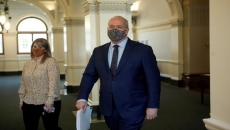The distinctive milky turquoise of mountain lakes is going the way of the glaciers that feed them, according to new research.
"A lot of the turquoise glacial lakes in the Canadian Rockies are clearing up," said Rolf Vinebrooke, who studies such lakes at the University of Alberta. "They're turning more the blue colour that people think of as normal lakes."
The delicate, translucent celadon that says "alpine" to mountain-lovers everywhere comes from glacial meltwater. Even small glaciers are massive rivers of ice that can pulverize rock into flour-fine particles and it's those particles that tint the lakes.
"The sunlight reflects off these white particles," said Vinebrooke, who published his finding in the latest State of the Mountains report for the Alpine Club of Canada. "Because of the scattering of the light as it hits these particles, the lake takes on this turquoise colour."
Glaciers, though, have been hard hit by climate change. And not just the big ones.
"Between the '70s and the '90s, when nobody was talking about global warming, a lot of these smaller glaciers had already melted and disappeared."
Vinebrooke took archival pictures of many lakes shot in the middle of the last century and compared them to modern images. Even in the black-and-white of the earlier pictures, the change was evident.
Then, the researchers took sediment cores from the bottom of the lakes. Sediment cores reveal a lake's history much like the layers of growth in a tree trunk.
"We were looking for clear blue mountain lakes," Vinebrooks said. "We found them, then we realized when we took these sediment cores that they had only been a clear blue colour for the last couple decades.
"We found a lot of lakes that are clear now, but just a few decades ago were turquoise. Their small glacier had melted."
The colour change didn't happen everywhere, but it happened frequently. It also appears to have happened fairly quickly.
"In the span of a few years, it shifts over and the lake goes clear," said Vinebrooke.
He said it's happening right now in places like Geraldine Lakes, a series of alpine lakes in Jasper National Park.
"We've got multiple lines of evidence that show all that pretty convincingly."
Vinebrooke said a clear blue lake admits much more sunlight into depths than a lake clouded with glacial flour. That's likely to bring in a much different local ecology, he said
"You increase the potential for that lake to be more productive because there's more microscopic algal growth in those lakes."
But there are winners and losers.
Organisms adapted to the low light of milky waters are unlikely to survive what would be to them a harsh new glare of ultraviolet radiation. The problem is especially acute because of the speed of the transition.
"If you take that sunscreen away, some organisms may not be able to tolerate that increase in UV radiation. It doesn't give organisms time to adapt."
Vinebrooke suspects some lakes, at least temporarily, may be left "biologically impoverished" -- especially since so many are remote and in austere settings.
Ultimately, he said, it's one more example of climate change already working to alter familiar touchstones.
"It captures the here and now effects of global warming."
<






